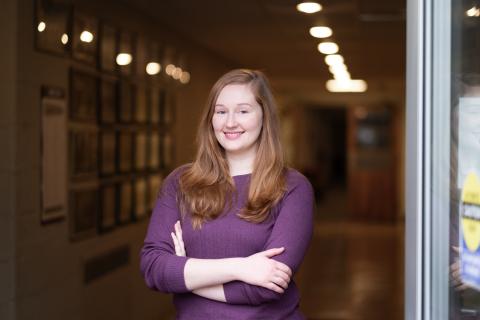GSSWSR: Stage to Service
How Ivy Elwell, M.S.S. ’23, pivoted from one “role” to another.

Ivy Elwell grew up in a big family in Iowa; her earliest memories are of singing in the choir and performing in community plays. She couldn’t have articulated it as a child, but, she says, “I gravitated to acting because I have always felt emotions deeply and been in tune with other people’s emotions.”
Elwell earned a Bachelor of Fine Arts in acting from Boston University in 2015, then headed to New York to pursue theater, film, and television work—picking up side gigs as a waitress, babysitter, and hostess.
While juggling these roles, Elwell noticed a pattern. “I saw that people in my industry and the families I was working with, too, were just not doing well,” she says. “I found myself caring so deeply about people’s well-being: their struggles, their family dynamics, their mental health.”
When the pandemic hit, followed by intense social justice protests across the U.S., she found herself at a crossroads. Talking to her therapist one day, it hit her: “I want to do what you do,” Elwell told her. “I have been lucky to have high-quality mental health services, and I believe that every person should have that same access.”
That realization inspired her to research graduate social work programs in the U.S. and overseas. Bryn Mawr’s Graduate School of Social Work and Social Research (GSSWSR) stood out in how it embraced career-changers.
“Other programs made me feel like I had to fit into their mold, but Bryn Mawr welcomed my background and what I could bring to the field,” Elwell says. She attended GSSWSR’s Career Changers Program workshop for potential applicants and “it just felt like another piece sliding into place,” she adds.
“Other programs made me feel like I had to fit into their mold, but Bryn Mawr welcomed my background and what I could bring to the field.” —Ivy Elwell, M.S.S. ’23
What sealed the deal was her admissions interview. “It was as much about me figuring out if the program was right as the admissions counselor figuring out if I was right for the program,” Elwell says. “She answered my questions without judgment and with creativity.”
Elwell enrolled in the full-time, two-year Master of Social Service program in 2021. In addition to her classwork, she found her internships particularly meaningful. She worked in a public school setting to support students with autism spectrum disorder. She also interned at The Renfrew Center in Philadelphia, which treats teens and adults with eating disorders.
Today, Elwell is a therapist with the Nourish Program at the Center for Families in suburban Philadelphia. She works with teens experiencing mental health struggles along with a difficult relationship with food and/or challenges with body image.
“I find myself growing every day,” she says.
And has she translated her skills as a performer into her work? “Absolutely. In both roles, you have to get to know people very quickly, and form a bond and learn to trust one another,” Elwell says. “And you have to listen really carefully.
“I never could have imagined that I would be where I am today,” she adds. “But Bryn Mawr takes such a personal approach and helped me see that the path was really wide open ahead of me.”
Published on: 03/14/2024